Breeding Goats can be so much fun, but you should also be prepared! Kidding time can be exciting, but also stressful. So, it is important you know exactly what goat kidding supplies to have in your birthing kit so you will be completely prepared.
A goat birthing kit is basically just a collection of all the supplies you need for during and right after kidding. It is important to have things like towels, iodine and lubricant for the actual birth. And to have things like colostrum, bottles and medications for right after birth in case there are any issues.
Goats gestation period is about 145-150 days, you will want to make sure you know the goat kidding signs, so you know exactly when to expect kids!
And also, make sure that you have a complete goat kidding supplies kit put together so that you have everything you could possibly need - that way if any issues arise, you will be ready to deal with them.
Your new baby goats will be here and springing off of anything they think looks like a goat toy in no time!
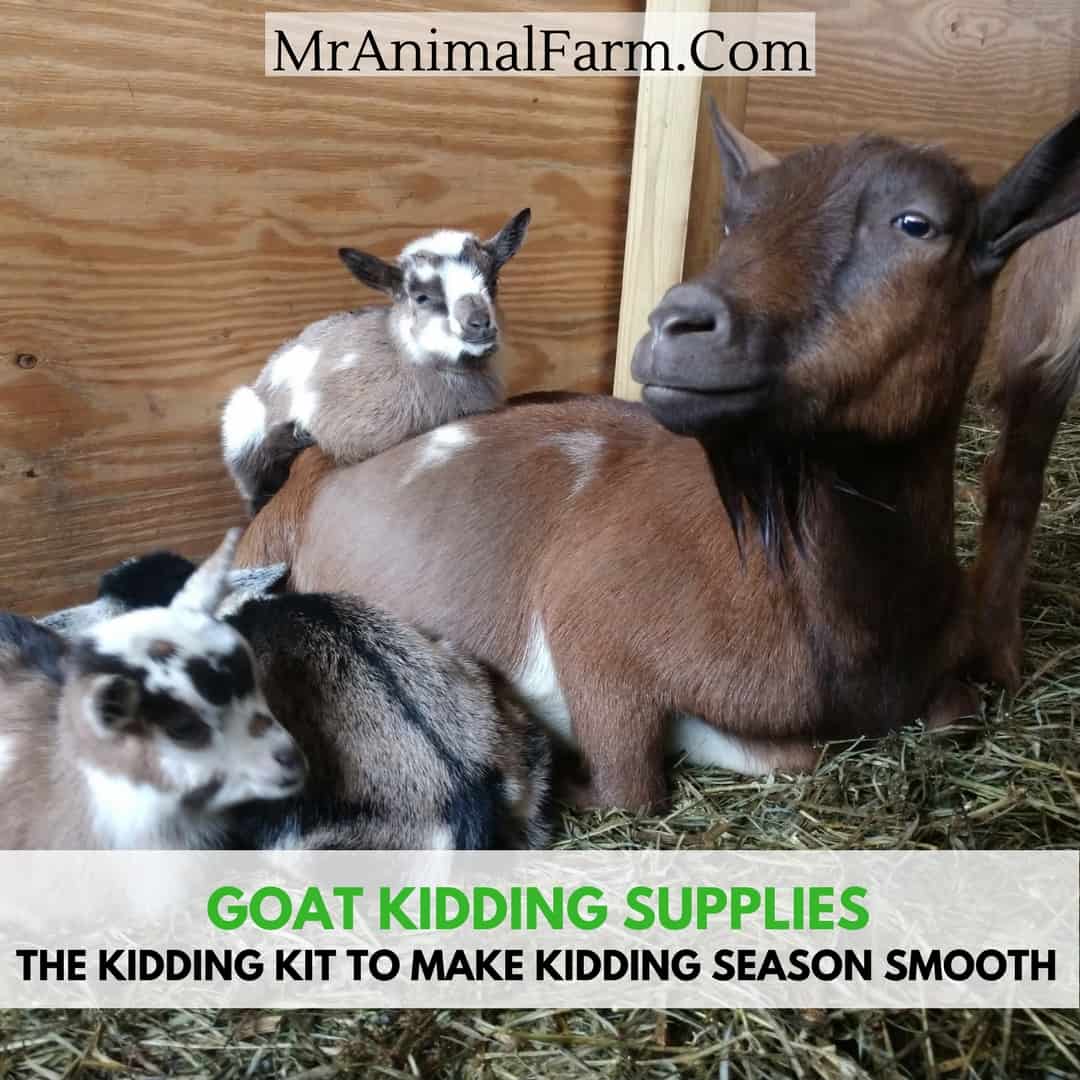
Here is the list of essential goat kidding supplies:
With the right goat supplies, goat medical supplies, and preparation, the excitement of baby goats can definitely outweigh any stress. Having the following supplies in your goat birthing kit will make your life easier regardless of what breed of goats your raise.
1) Towels
Lots and lots of towels! Kidding is not a clean thing. It is gooey and messy. And those babies will need to be dried off. (We clean their face and airways, and let their mom clean them the rest of the way for bonding time.)
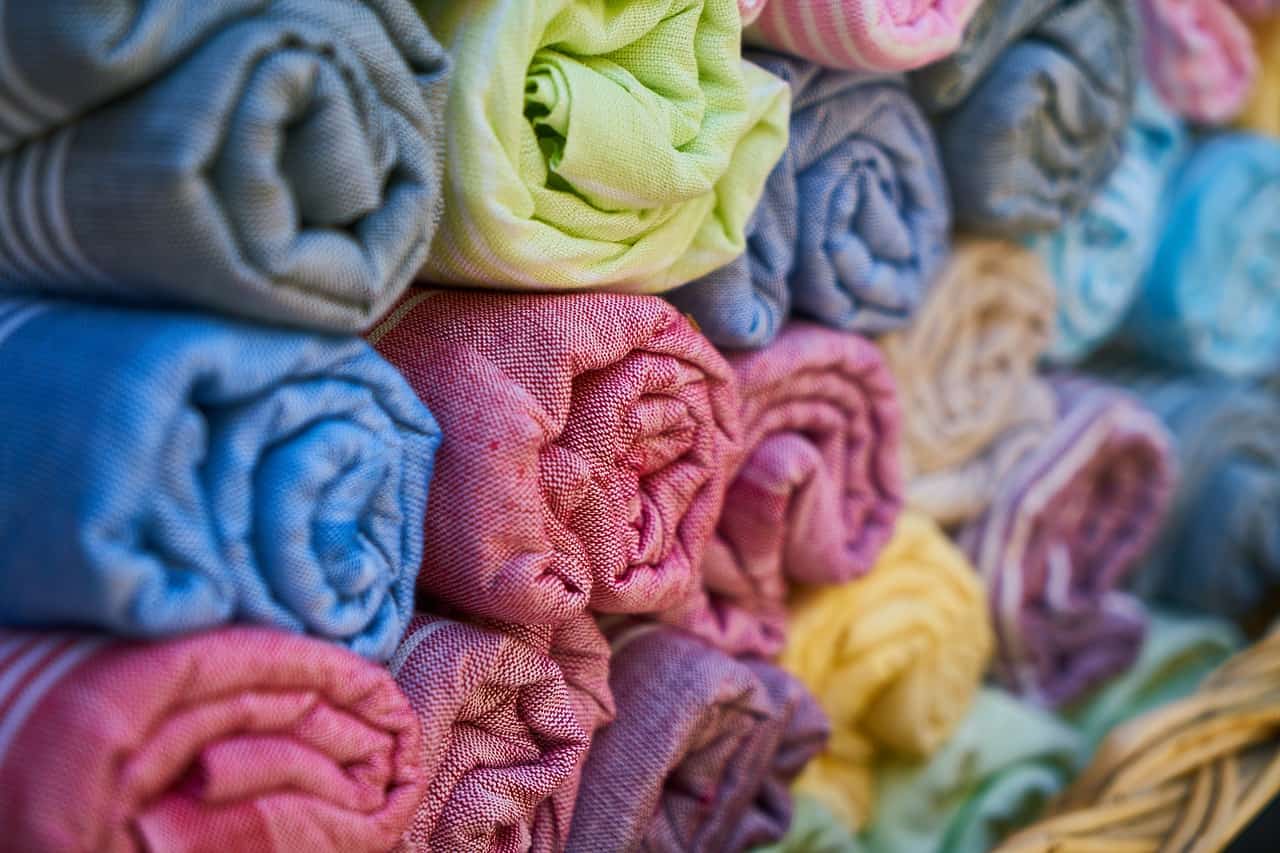
You can get these pretty cheap at a yard sale or your local thrift store. Our local Goodwill had large towels for around $1 each and smaller towels for .50 each.
You can also use disposable puppy pads or paper towels if you don't want to be washing towels after kidding.
2) Gloves
This is a personal preference and I guess isn't absolutely required but, trust me, you will want these. Things will be much cleaner and you don't have to worry about anything nasty getting in a micro cut you didn't know you had on your hand. Plus, sometimes you will need to assist a doe and pull a baby or two.
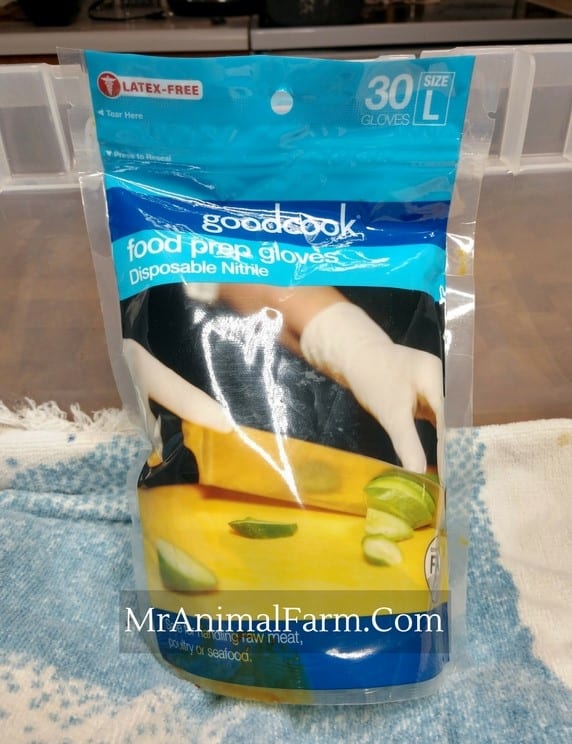
3) Water-Based Lubrication Gel
As we mentioned above, sometimes kidding doesn't go as easily as we would like and the doe needs some assistance. Since you already have your gloves, you will also need to use a lubrication to make things go a little more smoothly. Your doe will appreciate this item very, very much.
Need more help for your Kidding season? The Ultimate Goat Breeding Planner has you covered!
4) Hair Dryer
Our kidding season generally takes place during the coldest months of the year. Because of this, it is really easy for a baby's temperature to drop minutes after being born. They are soaking wet from the birthing sack and their mom is often trying to deliver multiple kids.
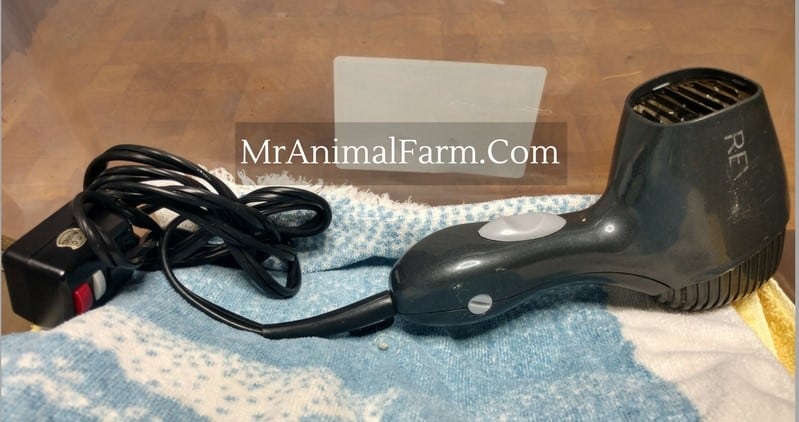
We have now made it a habit of practice to immediately start blow drying a baby as soon as we have as much of the birthing goo off as we can. This ensures the baby doesn't become hypothermic and won't be wasting precious pre-colostrum calories on maintaining their temperature.
You may also want to add a heat lamp to your goat birthing kit. You shouldn't leave a heat lamp on unattended as they are a fire hazard. However, sometimes it is good to have one for the kids if they are having issues with keeping their temperatures up. And if you have kids born early, sometimes you need one to use for a few days with a kid in the house.
5) Small container
Something such as a film canister or medicine cups works great for this. You will use it to fill with the iodine.
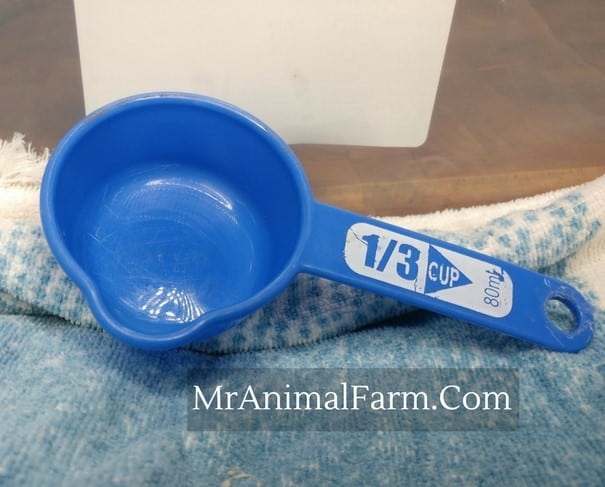
6) Iodine
You will want to have this on hand to dip navels in after kids are born. This helps to prevent any yucky bacteria from getting into the opening on their umbilical cord before it seals and dries off.
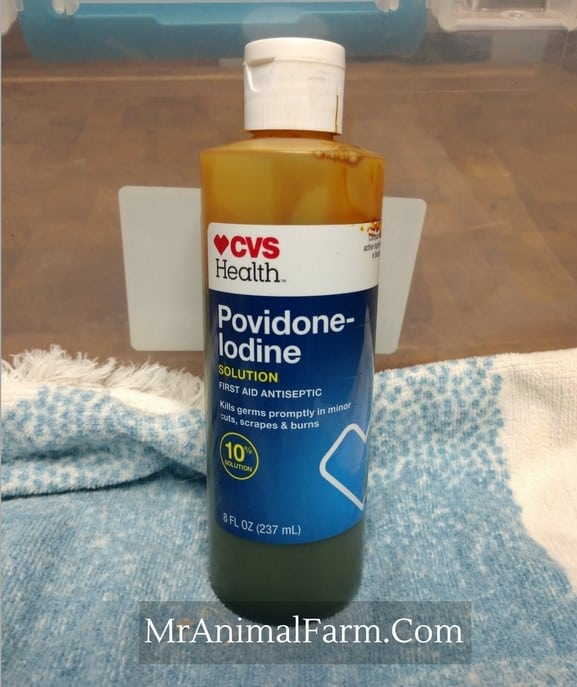
7) Colostrum and syringes
It is always good to have these on hand in case the babies have trouble latching on and nursing. You can either have powdered colostrum or frozen colostrum from a previous kidding. We usually start kids that are having difficulty latching on with either 1 lm or 3ml syringes and warmed colostrum. Typically after an ounce or so they are strong enough to get eating on their own.
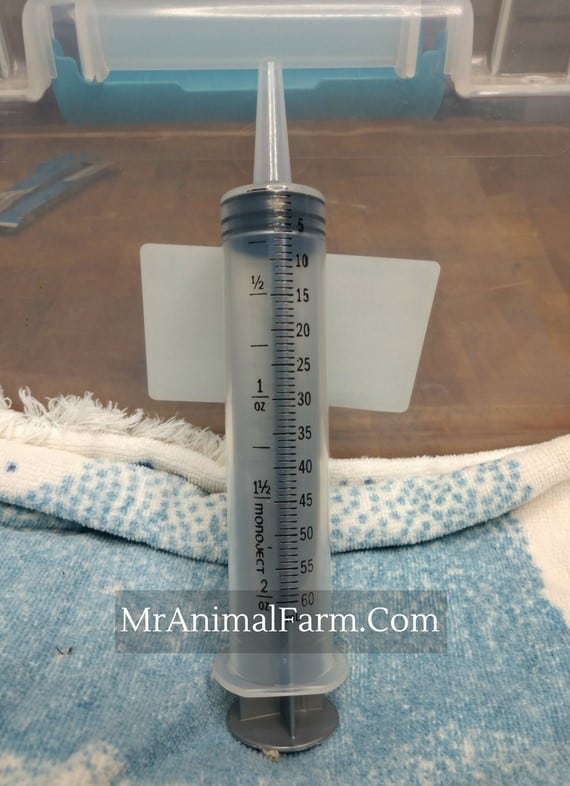
It is really important that they get colostrum right away, so having some on hand or being able to milk some from mom and syringe it to them is important.
8) Thermometer and Petroleum Jelly
We like to keep these on hand in case we think a baby is in danger of becoming hypothermic. If we have used the blow dryer and it doesn't seem to be helping, we get a quick read and can then decide if we need to take more advanced steps in care.
Having these easy to access in our goat birthing kit has literally made the difference between life and death for some of the kids born here.
After they are a few days old, you may also need to do temperature checks for various reasons, so good to keep on hand.
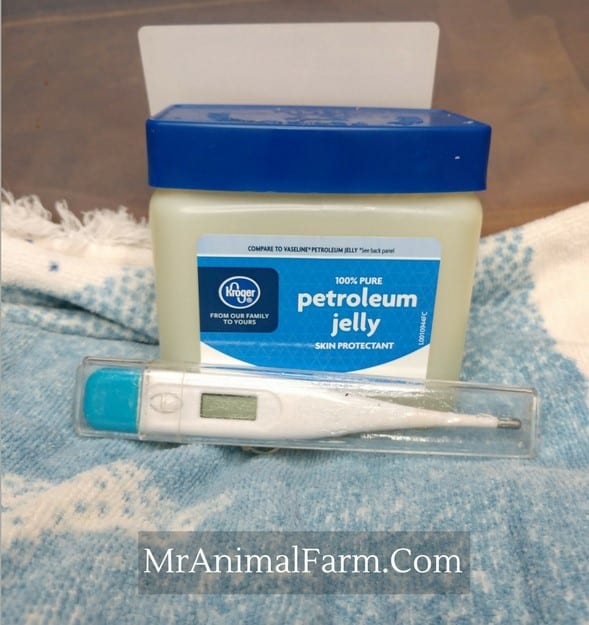
9) BOSE or Nutridrench
Depending on where you live, you may have a herd that is prone to selenium (or some other mineral/nutrient) deficiencies. Sometimes this is critical for a new baby goat to have. We always keep a bottle of BOSE (call your vet for availability) on hand and inject .25/cc IMMEDIATELY after the baby is dry enough to stay warm.
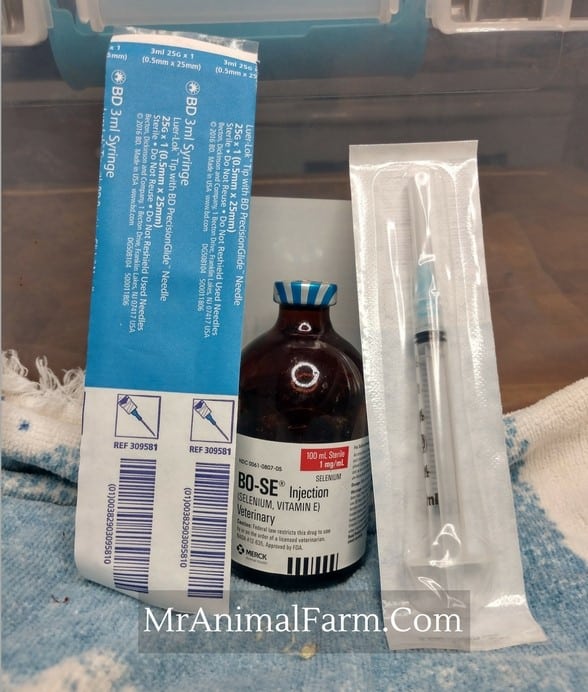
Babies can also experience a drop in their blood sugar. This is typically signaled by wobbly balance (not the cute kind, the scary kind) and a drooping head. If caught early, a quick dose of Nutridrench can help an ailing baby out immensely.
You can also use Karo syrup or molasses for a blood sugar drop. Dams will also appreciate some Karo syrup or molasses in warm water after kidding to get a boost in energy.
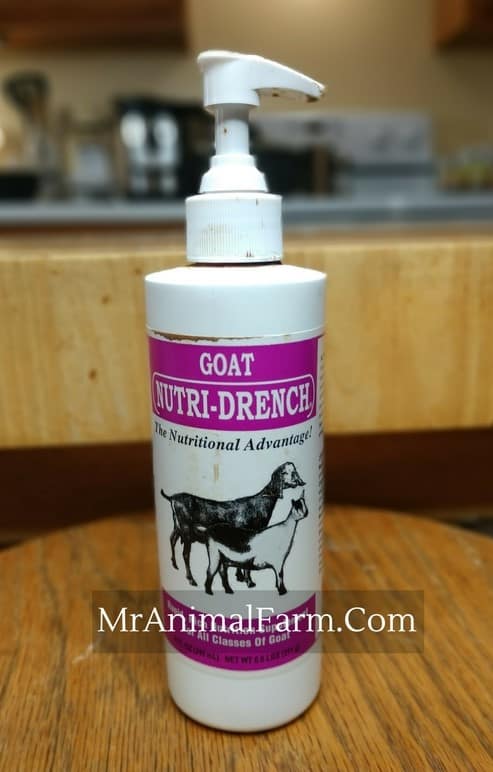
10) Feeding Tube
A feeding tube can be used in two ways. One, as a feeding tube for weak kids that do not have a suck reflex.
Secondly, occasionally kids will have bloating and constipation issues and it is good to have on hand to use to give enemas. That way they can get their fecal matter out and moving again.
11) Bottles & Pritchard Nipples
If you are going to bottle feed your kids, you will definitely need bottles and Pritchard Nipples. But, even if you plan to dam raise, you may have kids that end up needing to be bottled for various reasons. Therefore, you should always have some on hand.
It is also a good idea to have formula or frozen milk on hand in case you end up bottle feeding.
12) Dental Floss
Dental floss is important to have in case you need to break the umbilical cord. Sometimes it will break on it's own during birth or right after. Sometimes the kid or dam will stand or move and break it.
However, it it's still in tact, you may need to break it. Tying dental floss to the umbilical cord and then breaking on the side closest to the dam helps to ensure it isn't too short and also that the kid doesn't bleed much.
13) Milking Supplies
These will be important especially if you have dairy goats and plan to milk your goats. However, it's good to have a milk pail at least on hand in any situation in case you need to milk colostrum from the dam at first.
14) Various Medications
Medications will be a necessary addition to any goat birthing kit. There are a variety of issues that can arise for both dams and kids during and right after kidding.
So, it is always good to have things like antibiotics (LA-200 is a good all around to have on hand), probiotics (good for tummy issues and a stress pick me up), Albon (or other treatment of coccidiosis in goats, Cylence (for treatment of mites), CDT, needles and syringes.
You might not need all of these in one kidding season, but it is a big relief to have what you need already on hand so that you can address issues quickly.
15) Scale
This isn't a 100% MUST have for your goat birthing kit. However, it is certainly a nice to have. Especially if you end up having to give any medications (those are usually given by weight). Or, if you have a kid that is particularly small or not eating a ton, it is good to be able to make sure that they are gaining appropriately.
16) Vet Number
It is always good to have your vets phone number on hand in case of an emergency. Although the majority of kiddings will go smoothly, there is always a chance of something unexpected happening.
Knowing that you have a vet just a phone call a way can be peace of mind and can also help speed up getting help if an issue arises.
17) Large Weatherproof Tote
We use a large plastic tote to keep all of our kidding supplies in. It is weatherproof and stays in our hay loft all year long. Then when we need it, it is right there!
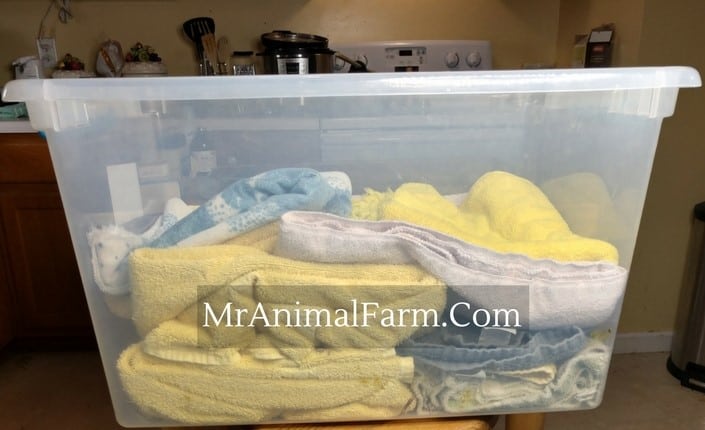
18) Patience
This is probably the most important thing to have with your goat birthing kit (for us at least). Kidding time is sometimes a waiting game. So, having a good amount of patience while waiting to see those sweet new babies is always helpful 🙂
What goat kidding supplies do you always keep on hand?
If you need more help getting your goat breeding running smoothly, check out The Ultimate Goat Breeding Planner - checklists, record sheets, supply lists and more to keep your breeding season going so you can enjoy the baby goats without worry.
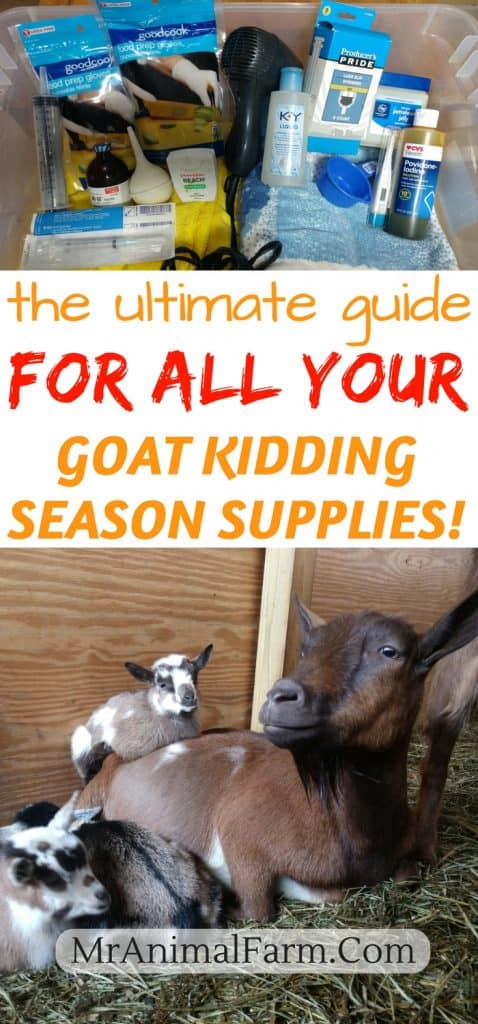

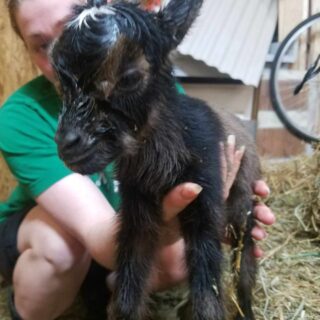
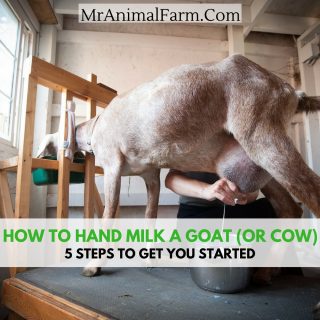
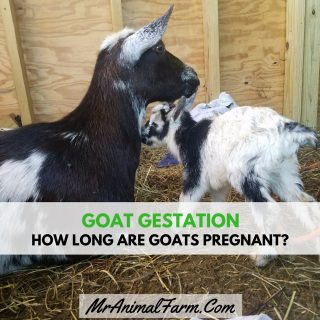
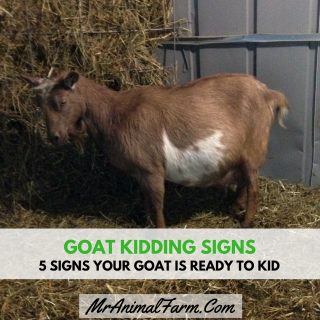
Barry Thompson says
Do u cut the umbilical cord? If so, st what length & what tool do u use? Where can I buy colostrum?
MrAnimal Farm says
Hi Barry,
Usually the umbilical cord will break on its' own - either when the mom stands up/moves or when the baby starts moving around. However, sometimes it does not and needs to be cut/tied off. We use simple dental floss. You can tie it around the umbilical cord (this alone will usually pop the cord - if it doesn't you can break it off with scissors or your fingers on the side closest to the mom). If you have to tie a cord off, make sure you leave a little (a few inches) on the baby.
It is always recommended to have real goat colostrum on hand. So, if you have a goat friend or mentor nearby who is willing to give you a little to have on hand for your first kidding, that is always optimal. Once you have your first kidding, you should milk some of the colostrum, put it into a freezer bag and keep it in case of emergencies. If you don't have the option of getting real goat colostrum, we suggest this: http://amzn.to/2kXFwXy (affiliate link for Amazon) which is Manna pro Goat Colostrum.
Let us know if you have any other questions!
Thanks,
Kristin